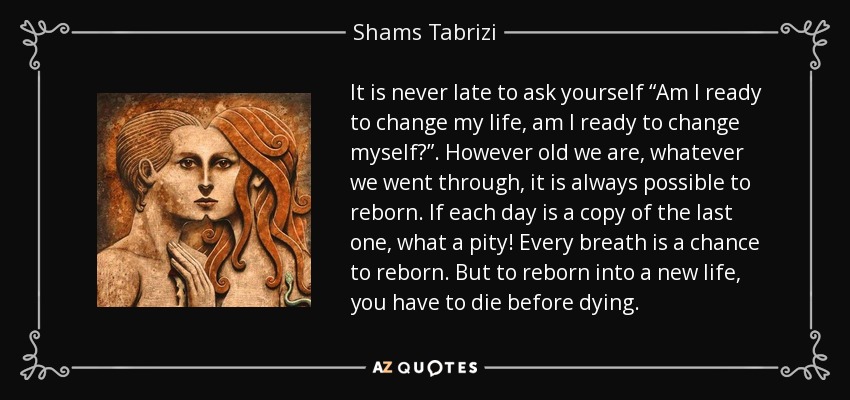
One day Rumi was reading next to a large stack of books. As it was said in Haji Bektash Veli’s book, “Makalat”, he was looking for something. He was claiming to be a travelling merchant. On 15 November 1244, a man in black suit from head to toe, came to the famous inn of Sugar Merchants of Konya. Shams Tabrizi stops Maulala for a question In so long as this phenomenon of transfer of souls had never been witnessed before nor did it happen again in the annals of history, it makes the story of these two oceans unique and one of its own kind. Rumi ends most of his poems with the name of Shams of Tabriz. That is why he did not use his name in any of the verses out of more than 50,000 verses that he left behind. Rumi has repeatedly said in his Mathnavi and Divan that it was not him but Shams talking through him. Shams was able to transfer, his knowledge and wisdom onto Rumi in a rather mysterious manner. Finally, as predicted by his teacher Kamal Jundi, the flowering of Sham’s gift took place and manifested itself in his counterpart, Jalal uddin Rumi. He did not lose any time to perfect the gift of the esoteric in him. He recognized it early on in his childhod, according to his own admission in the Maqalat ( an authentic record of his conversation with Rumi, recoded in Sultan Vald’s hand. Shams-I Tabriz was born with the gift and he perfected it through suffering his self. You give up your ‘ self ‘ to be one with the Ultimate. It is the human journey from fana to baqa. Some people are born with these gifts, in varying degrees ( they may not even be aware of their hidden potential) while others can get there through personal struggle to get close to God ( taqarrub or salook). It is said that God lends His power or phenomenon of immediate Being to his chosen people, such as Prohets or Saints. In Quran, God says ” Kun Fa ya Koon “.(We say, Be and it is). This was no magic or illusion this was a God-given gift. Rumi saw it when Shams threw his hand-written manuscripts in the water, then taking them out, dry and intact, with no sign of water on the pages. He kept it however from the ordinary people. He was capable of doing things that seemed extra-ordinary, uncanny or supernatural to an undiscerning eye. In return, he received the uncanny gift of knowing the other person’s mind, predicting the events, even transferring himself from one place to another (ta’y ardh ). He virtually starved his body, as if saying no to his self. An occasional meal (bread and soup) would be enough for days.


Instead he stayed at the Traders inns, showing himself as a traveling salesman. He avoided staying at the seminaries and khankahs. He detested faqihs (scholars) because they indulged in useless polemics and diatribes. He disliked the mystics because they had given up the Shari’a (practice). He was also advised by his master to stay away from the sufis as well as the faqihs (religious scholars) which he did.Īlways traveling from place to place (he was called parinda or flying bird for hat reason), Shams would show up at times at the seminaries and madrisas, however, without revealing his credentials. He was however told that he had to wait until his future student was ready to receive from him the promised gift. He was certified by Kamal Jundi as a master himself and was cautioned that he would stay away from the odinary and the mundane and that one day he will meet with someone who will act as his mouthpiece and speak to the world on his behalf. Shams Tabriz who had an innate and inborn gift for the metaphysical accomplished himself as a master within a relatively short period. When Shams-i Tabriz demonstrated his interest in learning the esoteric and the metaphysical, he recommended that he would go to a master teacher, Kamal Jundi. He studied various sciences with Abubakar Sanjasi Tabrizi, a reknown mystic teacher of Najmuddin Kubra order.

He was sent to Tabriz to seek further knowledge.

He had studied Quran and jurisprudence with his father and uncle, both accomplished Jurists, very early in life. Shams-i Tabriz was, without doubt, a no ordinary person. The tomb of Shams-i Tabrīzī was recently nominated to be a UNESCO World Heritage Site. Tradition holds that Shams taught Rumi in seclusion in Konya for a period of forty days, before fleeing for Damascus. Shams-i-Tabrīzī or Shams al-Din Mohammad (1185–1248) was a Persian Muslim, who is credited as the spiritual instructor of Mewlānā Jalāl ad-Dīn Muhammad Balkhi, also known as Rumi and is referenced with great reverence in Rumi’s poetic collection, in particular Diwan-i Shams-i Tabrīzī (The Works of Shams of Tabriz).


 0 kommentar(er)
0 kommentar(er)
